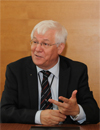 |
||
|
Major Couterterrorism Project Frozen due to Russia-NATO Dispute - Alliance Ex-Official RIA Novosti, PUBLISHED 19.06.2014 Disagreements between Russia and NATO have led to a temporary suspention of a major antiterrorism project STANDEX, former Deputy Assistant Secretary General of NATO Michael Stopford told journalists. "The Science for Peace and Security Programme is NATO’s largest civilian funding program which was set up to undertake projects with the purpose of working on new emerging security challenges. We define those challenges as cyber security, nuclear issues and, above all, terrorists. The highest profile project under that program that I was responsible for, called the STANDEX, to develop a stand-off detection of explosives and suicide bombers," Stopford said. NATO has been increasing the presence of its forces in the Eastern European countries close to the Russian borders lately as the Ukrainian crisis escalated, explaining the action with the need to protect its member states from possible invasion. The alliance has reconnaissance ships in the Black Sea, and has been holding military drills in the Baltic States. Topics: Russia Other news: Russia May Sign Agreement to Build 8 Reactors in Iran A source close to the negotiations told journalists Thursday. Hungary Enacts Law to Expand Nuclear Power With Russian Aid Hungary’s president has signed a bill into law to expand a nuclear power plant in the country with Russian assistance. Hungary Lawmakers OK Russia Nuclear Plant Deal Russia will provide Hungary a loan of up to 10 billion euros ($13.5 billion) - around 80 percent of construction costs. |
Hero of the day 
We are currently working with the Nuclear Decommissioning Authority (NDA) on this approach, which was submitted in response to their February 2012 call for alternative proposals. We appreciate that the UK is in the early stages of their policy development activities and are pleased to be involved in such important work. INTERVIEW
Yanko Yanev OPINION
Joint Plan of Action |

